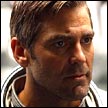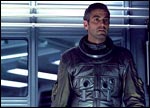
|
The Blade Runner hangover
Steven Soderbergh promised an 'erotically charged' film but Solaris is melodramatic
|
Jeet Thayil
Watching the press screening of Steven Soderbergh's new version of the classic sci-fi film Solaris was a little like watching a comedy in a foreign country. Members of the audience laughed throughout the screening. The laughter was especially loud at critical moments as George Clooney's character Kris Kelvin and his dead wife Rhea (Natascha McElhone) discussed morality, suicide and redemption.
The people who reacted in such a contemptuous fashion were critics, of course. No doubt they held Andrei Tarkovsky's 1972 version as the gold standard and any deviation as infradig. They were laughing at Soderbergh's too wordy script. Granted, there were parts that sounded juvenile.
Soderbergh promised an 'erotically charged' film but has delivered melodrama. Also, he has been quoted as saying his version of Solaris would be a cross between Last Tango in Paris and Stanley Kubrick's 2001. Those are hugely ambitious standards to live up to. Of course he fails. But if it fails, Solaris is a glorious failure. There are moments of genuine suspense and many beautifully shot sequences.
Soderbergh has based his version on the Polish writer Stanislaw Lem's classic book rather than Tarkovsky's clairvoyant Russian film. He wrote the screenplay, edited, photographed as well as directed. James Cameron, who owns film rights to the novel, is one of the producers of the movie. So is Jon Landau, Bruce Springsteen's producer and former journalist, the man who famously said, "I have seen the future and its name is Bruce Springsteen." 
Kelvin is an astronaut and psychiatrist sent to investigate a space station orbiting an oceanic planet called Solaris. He arrives at the station to discover that the commander is dead, a suicide, and the station's remaining two crew members are almost crazy, labouring under the notion that the planet has mined their memories and is sending them visitors from their past. Soon enough, Kelvin receives a visit from his wife, who killed herself back on Earth. She has been restored to a facsimile version of herself, though she is nothing more than Kelvin's memories of her and has no independent existence of her own.
Soderbergh previously directed Clooney in Ocean's Eleven and Out Of Sight. Here, Clooney essays a workmanlike role. He is watchable, though he brings little flair to the character. The luminous McElhone plays an unstable wife who is unable to believe in herself as a complete person even before Solaris recreates her.
It is impossible to make a science fiction movie today without escaping the influence of 2001 or Ridley Scott's Blade Runner and Soderbergh does not even try. Like 2001 some of the key sequences of the space station has the frozen tranquil beauty of that seminal classic. The viewer may even find himself yearning for classical music to complete his experience.
Like Blade Runner the movie often takes place with rain falling over the landscape, drenching the actors as they attempt to negotiate their way through a hostile environment. Like Blade Runner Clooney even wears a trench-coat, reminiscent of Harrison Ford's, and cultivates a noir melancholy.
Jeremy Davies as Snow is the film's most delightful character. Last seen in Secretary this actor is fun to watch. He has a strangely offhand, slacker manner that illuminates rather than diminishes. And at times he seemed to bring genuine laughs to the proceedings, rather than sarcastic hoots of derision. He has a way of using his hands and mumbling that sometimes borders on annoying but always manages to pull itself back at the last moment.
Tell us what you think of this review